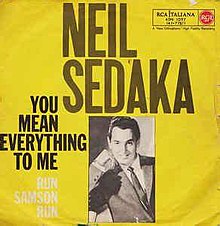
Gene Francis Alan Pitney was an American singer, songwriter and musician.

Connie Francis is an American pop singer, actress, and top-charting female vocalist of the late 1950s and early 1960s. She is estimated to have sold more than 100 million records worldwide.
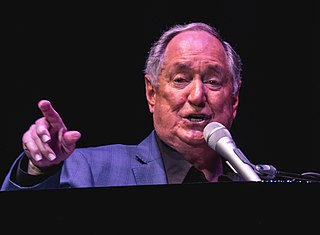
Neil Sedaka is an American singer, songwriter and pianist. Since his music career began in 1957, he has sold millions of records worldwide and has written or co-written over 500 songs for himself and other artists, collaborating mostly with lyricists Howard "Howie" Greenfield and Phil Cody.

Gerald Goffin was an American lyricist. Collaborating initially with his first wife, Carole King, he co-wrote many international pop hits of the early and mid-1960s, including the US No.1 hits "Will You Love Me Tomorrow", "Take Good Care of My Baby", "The Loco-Motion", and "Go Away Little Girl". It was later said of Goffin that his gift was "to find words that expressed what many young people were feeling but were unable to articulate."

Howard Greenfield was an American lyricist and songwriter, who for several years in the 1960s worked out of the famous Brill Building. He is best known for his successful songwriting collaborations, including one with Neil Sedaka from the late 1950s to the mid-1970s, and near-simultaneous songwriting partnerships with Jack Keller and Helen Miller throughout most of the 1960s.

"Breaking Up Is Hard to Do" is a song recorded by Neil Sedaka, co-written by Sedaka and Howard Greenfield. Sedaka recorded this song twice, in 1962 and 1975, in two significantly different arrangements, and it is considered to be his signature song. Between 1970 and 1975, it was a top-40 hit three separate times for three separate artists: Lenny Welch, The Partridge Family and Sedaka's second version. The song was also adapted into multiple languages, most notably in Italian and French.
"Love Will Keep Us Together" is a song written by Neil Sedaka and Howard Greenfield. It was first recorded by Sedaka in 1973. The brother-sister duo Mac and Katie Kissoon also recorded a version in 1973. American pop duo Captain & Tennille covered it in 1975; their version became a worldwide hit.

"Stupid Cupid" is a song written by Howard Greenfield and Neil Sedaka which became a hit for Connie Francis in 1958.
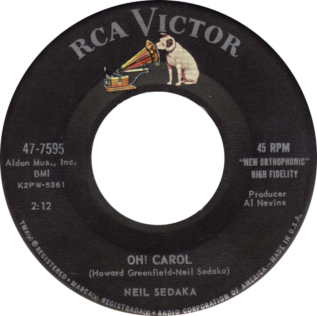
"Oh! Carol" is an international hit written by Neil Sedaka and Howard Greenfield in 1958, and recorded by Sedaka.
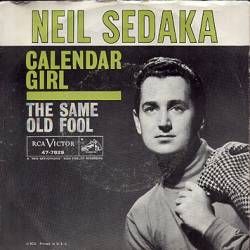
"Calendar Girl" is a song by Neil Sedaka. The music was composed by Sedaka and the lyrics by Howard Greenfield. Released in December 1960 as a single, it was a hit single for Sedaka, peaking at No. 4 on the US charts, No. 3 in Australia, and No. 1 on the Canadian and Japanese charts.
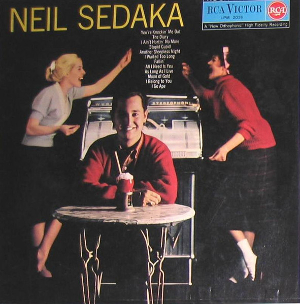
Rock with Neil Sedaka or just Neil Sedaka is the first major solo album of Neil Sedaka released in April 1959 after two 1958 albums under the titles Neil Sedaka and The Tokens and Neil Sedaka and The Tokens and Coins. The album was released by RCA Victor and was produced by Al Nevins. The album contains 12 songs, all of them co-written by Sedaka and his friend Howard Greenfield. Two of the songs became successful singles for Sedaka from the album, namely "The Diary", his debut single that was a hit, reaching No. 14 on the US Billboard charts, and "I Go Ape", a single that was relatively successful in the United States reaching No. 42, but did far better in the UK Singles Chart, making it up to No. 9 and his debut single in the United Kingdom.

"Stairway to Heaven" is a song written by Neil Sedaka and Howard Greenfield. It was released as a 45 rpm single and appeared on Sedaka's 1960 album Neil Sedaka Sings Little Devil and His Other Hits.
"Run Samson Run" is a song written by Neil Sedaka and Howard Greenfield and sung by Neil Sedaka. It appears on his album Neil Sedaka Sings Little Devil and His Other Hits. The song was included in Neil Sedaka Sings His Greatest Hits (1959–1963).
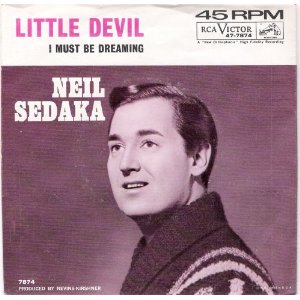
"Little Devil" is a song written by Neil Sedaka and Howard Greenfield which was released by Sedaka as a single in 1961. The title track of Sedaka's 1961 album Neil Sedaka Sings Little Devil and His Other Hits, it was a hit, reaching #11 in the US Billboard Charts.
"Eternally" is a song with music by Charlie Chaplin, and words by the English lyricists Geoff Parsons and John Turner. The music was initially composed for Chaplin's film Limelight (1952) and titled "Terry's Theme"; the film won an Oscar for "Best Original Dramatic Score" at the 45th Academy Awards in 1973.
The following is a comprehensive discography of Neil Sedaka, the American singer.

The Many Sides Of Neil Sedaka is a 1978 compilation album released by RCA Victor Records containing the works of pop singer Neil Sedaka. The album contains some of Sedaka's lesser-known works in the period from 1958-1965, although three of the songs on the album were charting hits at the time of their original release.

"Where the Boys Are" is a song written by Neil Sedaka and Howard Greenfield for, and first recorded by, Connie Francis as the title track of the 1960 movie by the same name in which she was co-starring.
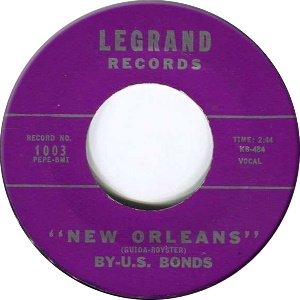
"New Orleans" is a song written by Frank Guida and Joseph Royster and performed by Gary U.S. Bonds. It was featured on his 1961 album Dance 'Til Quarter to Three with U.S. Bonds. Frank Guida also produced the track. Backing was provided by Gene Barge's group The Church Street Five. Bonds's version was reportedly a favorite of British musician and member of The Beatles, John Lennon.

"Our Last Song Together" is a 1973 song recorded by Neil Sedaka. It is a track from his LP The Tra-La Days Are Over, and was the third of four single releases from the album.
